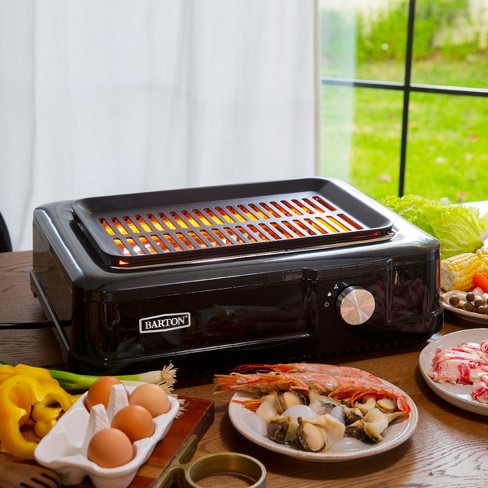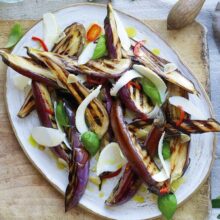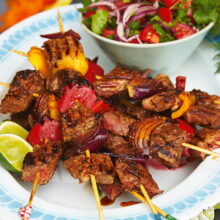How to Get Non-Stick Grill Grates

Having food stick to your grill grates can be annoying. But, you can avoid this problem if you use a few simple tricks.
Start by making sure your grill is clean before cooking. This will prevent old burnt food particles from sticking to the next food you put on your grill.
Should You Spray Your Grill Before Cooking?
If you’ve ever grilled a steak, you know how frustrating it can be when the meat sticks to the grill grates. There are a few things you can do to prevent this from happening. One of the most important is seasoning your grill before cooking. This will help to keep rust at bay and will also make your food taste better.
Another thing that can help to prevent your food from sticking is a non-stick spray. This can be found at your local supermarket and is easy to use.
Luckily, there are many different types of sprays that you can choose from. Some of them are actually a lot more effective than others, so you should do some research before buying.
One of the best options is a spray with a high smoke point like canola oil or avocado oil. These oils have a smoking point of over 400 degrees Fahrenheit and will help to keep your food from sticking to the grill.
In addition to preventing your food from sticking to the grill, the right kind of spray can also help your food cook more quickly and evenly. It can also make it easier to remove a piece of food from the grill.
You should also consider the safety of your spray before you use it. Some of these products contain propellants, which are hazardous to humans and the environment. It’s also not advised to use this product on a hot grill because it could cause flare-ups.
You can also try using a hot grill brush. This will help to keep your food from sticking to your grill, but it isn’t as effective as a non-stick spray.
Oil Your Food Before Cooking
Oiling your food before grilling can make the whole process a lot easier, and it has several benefits. It helps the food stay moist and juicy and reduces the chance of it sticking to the grill. It also protects your grill’s grates from rusting, and it makes it easy to clean them after cooking.
The best cooking oils are those with a high smoke point, such as canola or corn oil. Extra-virgin olive oil isn’t recommended, as it can burn too easily, resulting in bitter or off-flavors.
It’s also a good idea to use a high-quality, refined oil. These types of oils are usually easier to work with and have a longer shelf life than other cooking fats, so they’re ideal for oiling your food before you grill.
You can either spray the cooking oil directly on your grate or brush it on using a basting brush. Whichever method you choose, be sure to wipe away any excess oil with a paper towel.
Whether you’re grilling over a gas or charcoal grill, it’s important to clean the grates after each time you cook so they aren’t covered in old grease. The grime and carbon buildup can lead to bacteria growth on the grates, which isn’t a good thing.
When cleaning the grates, it’s important to thoroughly scrub them with a grill brush before using soap or detergent. It’s also a good idea to rinse them off in a sink before sealing them up in a garbage bag.
The first few times you grill, you should apply oil to the grates before you cook to help season them. This will come unnecessary as your grill dries out, so be sure to use it sparingly.
Oil Your Grates Before Cooking
Many grilling books and websites tell you to grease your grates before cooking, but this practice is not a good idea. It will not help your food cook, it will actually ruin it! In fact, it is not even recommended by one of the most famous grilling cookbooks out there, Meathead: The Science of Great Barbecue and Grilling.
Instead, oil your grill grates right before you put food on them and after each use for the best results. You can do this either with a spray cooking oil or by brushing it on. Regardless of how you do it, always wipe off the excess oil with a paper towel.
Using a non-stick cooking oil like vegetable oil or canola oil will make your grill grates non-stick and also add a layer of protection against rusting. This type of cooking oil has a high smoke point, so it can withstand the high temperatures associated with grilling.
If you have a gas grill, it is important to remember to preheat your grill before adding food to it. This will allow the flames to blast away any bacteria that may be stuck to your grill.
Once the grill has reached the correct temperature, it is important to clean your grill grates. This will remove any rust that has formed on your grill grates, and prevent it from happening again.
After cleaning your grates, it is important to store them properly. It is a good idea to place your grill grates inside a plastic bag before storing them for the winter. This will keep them from getting dirty and making it harder to clean them when it is time to use them again.
Oil Your Cast Iron Grill
One way to ensure your cast iron grill grates last as long as possible is by oiling them regularly. This process, which is known as seasoning, creates a protective coating that helps prevent rust and gives your grates a nonstick quality.
You can easily season your grill grates by applying a light coating of cooking oil to them and letting it bake into the cast iron. A high smoke point oil, such as avocado or rice bran oil, works best, but you can also use a neutral vegetable oil.
Spread a thin layer of oil on your cast iron grill grates with a basting brush or an oil mister, making sure to coat the entire surface. This process takes a few weeks or months, but eventually your grates will be fully seasoned and ready to use.
Once your grates are seasoned, you can enjoy them for years to come without having to worry about food sticking or rusting. However, you should still give them a good cleaning before using again.
Before you begin to cook, give your cast iron grill grates a quick brush to remove any leftover food or debris. This will help them release food more easily.
After you’re finished cooking, give your cast iron grill grates ten minutes to cool before turning them off. This will allow the oil to bake into your grill grates and form a nonstick coating that will keep your food from sticking to the grates.
Occasionally, you can use mild dish soap or an all-natural cast iron cleaner to help you lift tough debris from your grates. You shouldn’t use it as a regular practice, though, since soap can strip away that hard-earned seasoning.
Oil Your Stainless Steel Grill
When cooking on a stainless steel grill, it is important to keep the grates clean. Leftover food and greasy residue on the grates can cause your food to stick, making it difficult to remove from the grill.
Keeping the grates clean will also protect them from rusting. Rust will eventually eat away at the surface of your stainless steel grill, making it impossible to use.
To prevent this from happening, you can season your grill with oil to create non-stick grate surfaces. This will remove contaminants, repel rust and seal pores to stop food from sticking to the surface of your grill.
For the best results, choose a high-temp cooking oil, such as canola or peanut oil with a smoke point above 450deg F. These oils will withstand heat better and won’t burn or have an unpleasant odor.
After the grill has reached the right temperature, apply a light coat of oil to each of your grates. Let them cool down slightly and repeat this step until you have the perfect non-stick seasoning layer.
The seasoning process will improve your grill’s performance and make it easier to remove food from the grates. Plus, it will help the food to stay moist and flavorful longer.
Once the seasoning has been applied to your grill, it is important to properly clean your grill to ensure that you get the best results out of it. This means removing any impurities from the parts of the grill, which will ruin your seasoning and give your food an unpleasant metallic or chemical taste.
Did you miss our previous article…
https://notoriousbob.net/?p=2679



